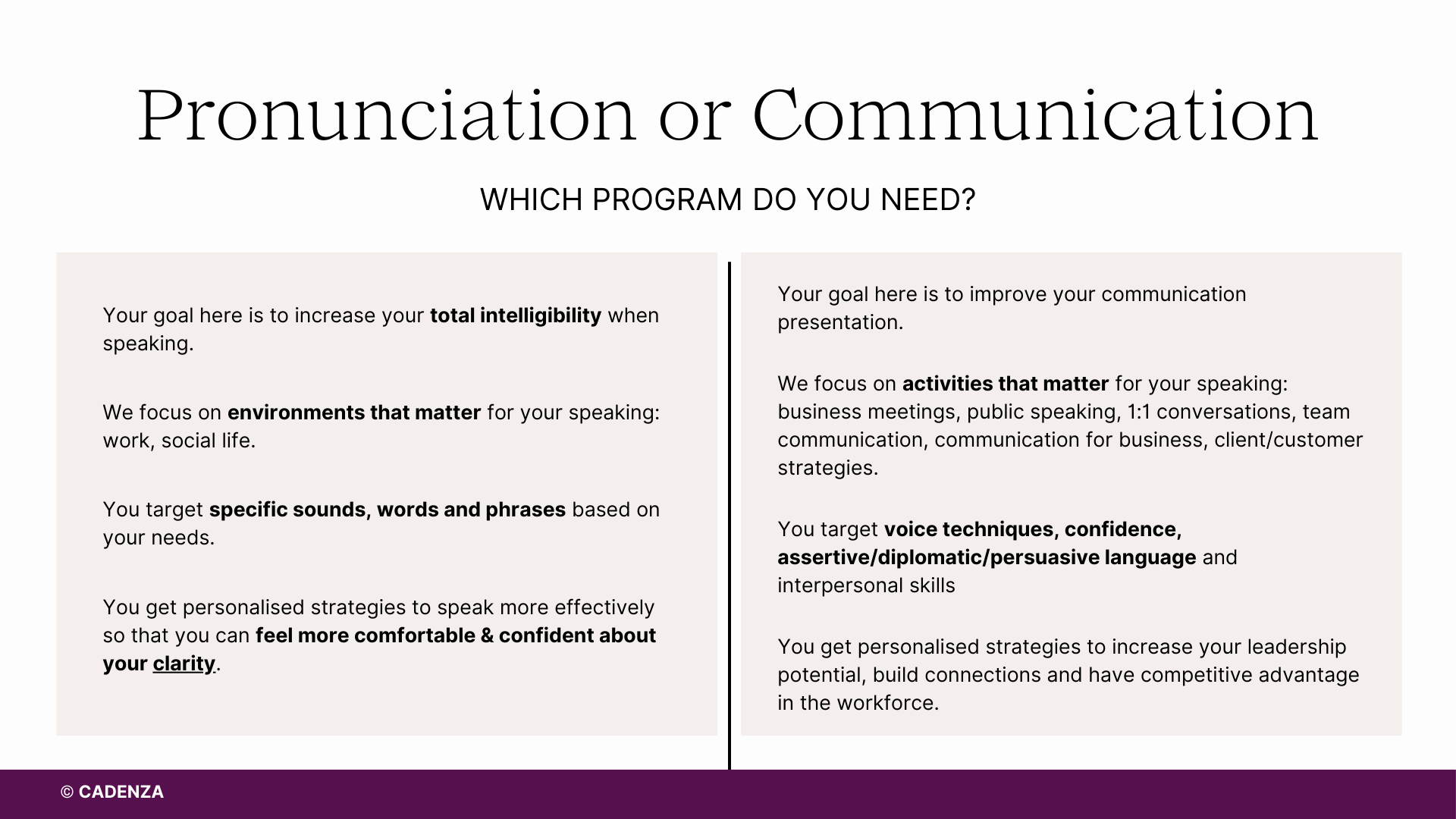Advocacy
Key Decisions when it comes to improving English Speaking

Improving English speaking is a detailed process so it is important to choose the correct approach. This blog compares options for enhancing your English speaking skills.
Perhaps you want to sound more confident, command the room, or stop having to repeat yourself.
But how do you determine what approach is best suited: pronunciation training or High Performance Communication Sessions (Elocution)?
Keep reading, this might help you clarify.

Being a multilingual communicator has a whole lot of benefits!
Scope: You can reach a greater expanse of people- more than a monolingual!
Experience: Cross continent knowledge in your field
Perspective: You can probably come up with fresher ideas in your job or business than others.
Even so, despite these winning attributes, barriers may still arise.
Research by Dr Foucart (Social Accent) tells us when the brain is listening to a foreign accent it needs to work harder to understand what is being said.
And yet it’s been found that an accent does not necessarily impact drastically on a speaker’s intelligibility. After all, everyone has one.
Yet, communication difficulties are still occurring at work.
How then, do we target these barriers at Cadenza when it comes to nuances around pronunciation, speaking confidence and accent variations?
With an ethical response.
First, take a read of our position statement on racism which sets the context.
Speaking with confidence
Researchers from McGill University found that negative bias (intentional or unintentional) makes listeners trust people with accents (that differ from our own) less.
Before you wonder how to control your circle so that your listeners all sound the same as you (not advisable) consider this research published in the Journal NeuroImage:
If multilingual speakers look confident when speaking, credibility drastically increases.
If you want to improve your English speaking, it pays to know what features make you sound more confident.
At Cadenza, we implement verified communication techniques so you can enhance your executive presence, charismatic delivery and credibilit, no matter the language you’re speaking. Our goal is to work with you to enhance your communication.
So back to our original question…
Will pronunciation training or career communication be the best fit if you feel less than confident speaking English?
Below we have mapped out a contrast between how career communication training addresses a speaker’s confidence where for the most part, pronunciation focuses on a set of sounds.
High-Performance Communication Sessions:
Cadenza’s high performance communication services aim to improve your communication agility and presentation. We provide you with evidence-based strategies to have more impact when communicating.
Our sessions can focus on a range of communication settings including, but not limited to:
- Business meetings,
- Public speaking,
- 1:1 situations,
- Team communication
- Client/ customer strategies
You will learn voice techniques to sound more confident, provide more assertive language, and build interpersonal skills.
These can be used to increase your effective leadership potential, build connections more successfully, enrich team cohesion and give you a competitive advantage in the workforce.
These programs start first with this service:
The High-Performance Communication Audit
Optimise your Voice Tone, Boost Your Delivery & Express Yourself Better.
You can only learn to speak confidently with anyone anywhere if you have the tools to transform your speaking logic & habits. And the High-Performance Communication Audit shows you how. This science-based communication service helps you speak with clarity, charisma & confidence.
Learn more about this personalised and strategic solution for your professional communication now.
Pronunciation Training
While this is an area of deep expertise with our founder dedicating over a decade to phonetic training with mulgtilinguals, we do not typically provide this service at Cadenza.
Pronunciation training (often known as accent reduction) has it’s limits in that it will focus primarily on the sounds of one specific language. But if you’re multilingual or in a high pressure career, this will not be sufficient to gain composure and a distinctly confident delivery in high stakes environments.
Pronunciation training typically focuses on specific sounds, words and phrases and is much closer to therapy methods than career-based methods.
At Cadenza our aim is for you or your team to walk away with the skills you need to reach your full communication potential. We are more than happy to discuss with you suitable approaches to fine-tuning your career communication and building a confident professional profile.
If workplace is communication is a concern for you or your business team you can see more information at the following links.
Learn more about our Communication Training pathways for:
Did you enjoy this post? Make sure to subscribe to our YouTube channel to get more content to increase your communication skills!
About the Author
Dr. Sarah Lobegeiger de Rodriguez is a Keynote Speaker, Executive Speaking Coach, and Opera Singer who likes to play with words, sounds, and your impact.
Her academic background is in Music Performance, Communication Science and Speech & Language Pathology. She assists executive communication clients all over the world as a communication consultant with strong expertise in CEO, Founder and Entrepreneur communication strategies.
Connect with Sarah on LinkedIn.
References
- Deprez-Sims, Anne-Sophie, and Scott B. Morris. “Accents in the Workplace: Their Effects during a Job Interview.” International Journal of Psychology 45.6 (2010): 417-26. Web.
- Everyone has an Accent, Roberto Rey Agudo, The New York Times, July 14, 2018
- Accent Discrimination: Let’s Call the Whole Thing Off, Raquel Magalhaes
Further Reading
Level 14, 380 St Kilda Road, Melbourne, 3004
Privacy Policy
Terms & Conditions
Position Statement on Racism







